We visited Harriet Johnson’s Maine garden last week, but just focused on what she’d planted in a space that had previously been an in ground pool. She mentioned to me that she had other garden spaces too, so I asked if she’d let us visit those as well… happily she agreed, and today we’re getting a tour of the space she calls her fence garden:
These photos of the fence garden were taken in 2021 through 2023. Some things I didn’t rephotograph this year and other things looked better previous years. While the pool garden with fill (sandy loam) did well this past rainy summer, the fence garden in my native clay loam soil was not as happy and I lost some of the yarrow I have grown without problem for 30 years. This border is about 40’ long and faces south. Because of its size I am able to grow some tall North American native plants that flower in late summer. I also can design with color repetition because this garden can be viewed as a single element unlike the immersion experience in the pool garden. The fence encloses the back yard including the pool garden, raised vegetable and iris beds, and a small shady area. The fence is important to the design of the area providing a western boundary to the fields beyond and the distant hills and mountains.
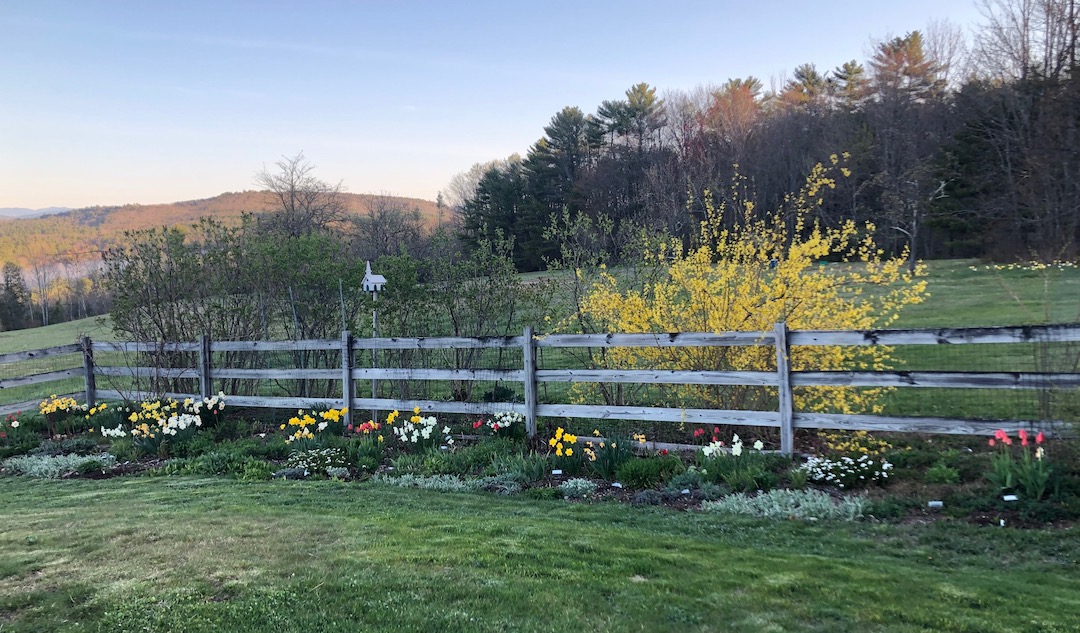
Color starts in the fence garden with tulips (Tulipa hybrids, Zone 3 – 8) and daffodils (Narcissus hybrids, Zone 3 – 8) in mid May for a yellow and red combination. An old forsythia (Forsythia x intermedia, Zone 5 – 8) matches the yellow daffodils. The photo was taken from the pool garden, a slightly higher area located on leveled ground.
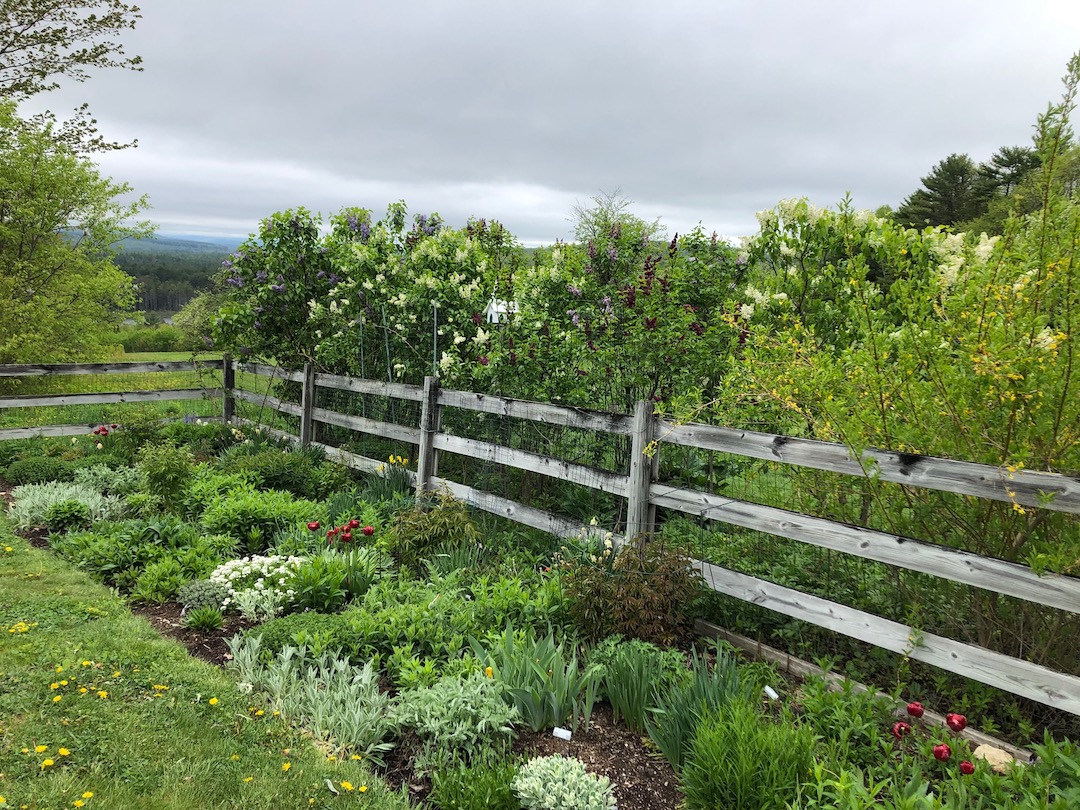
In late May or early June the lilacs (Syringa species and hybrids, Zone 3 – 8) bloom behind the fence, a hedge of six older Syringa vulgaris cultivars (only three are showing in the photo). Another island bed elsewhere includes three species of lilacs for early, middle and late bloom. I deadhead the fence lilacs after bloom so that they will not detract from the border’s flowers as the season progresses.
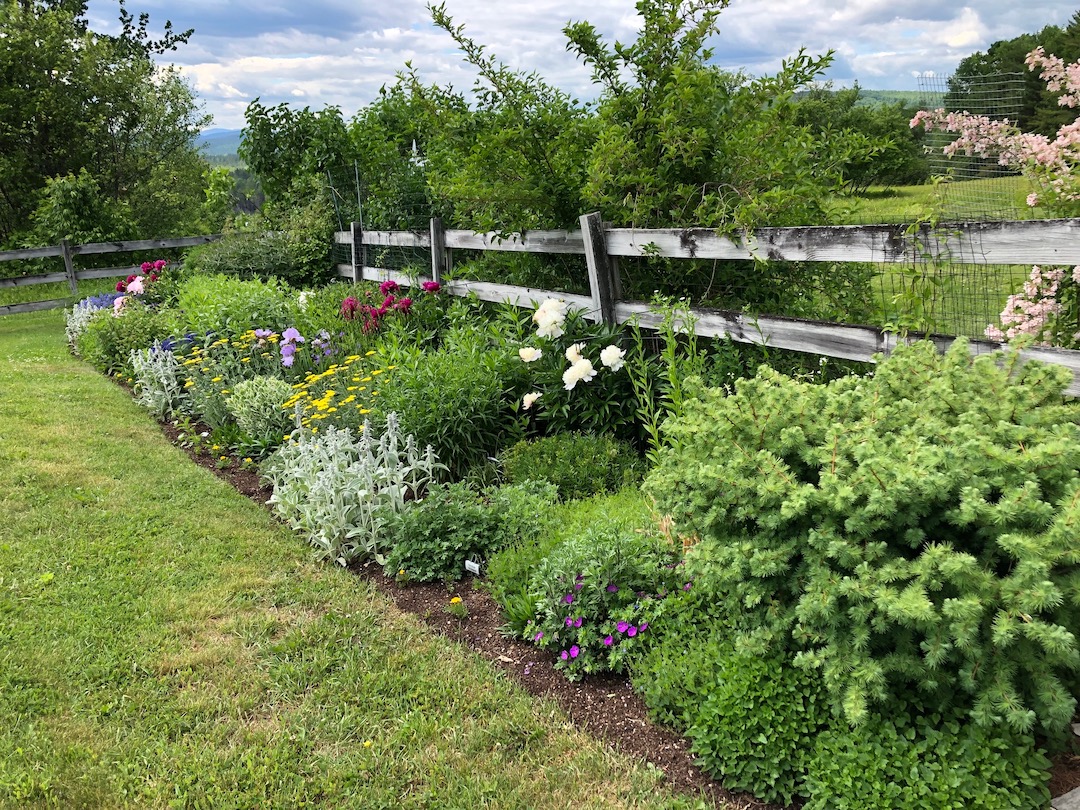
The June peak bloom as seen from near the top of the border. The larch (Larix sp., Zone 2 – 7) was originally planted as un upper extension to the garden and since then the Warburton iris collection has been planted above it increasing the length to all the useable space before the gate. The rhythm in the long picture is provided by yellow yarrow ‘Moonshine’ (Achillea ‘Moonshine’, Zone 3 – 8), mostly unknown peony cultivars, and Stachys byzantina (Lamb’s ears, Zone 4 – 8).
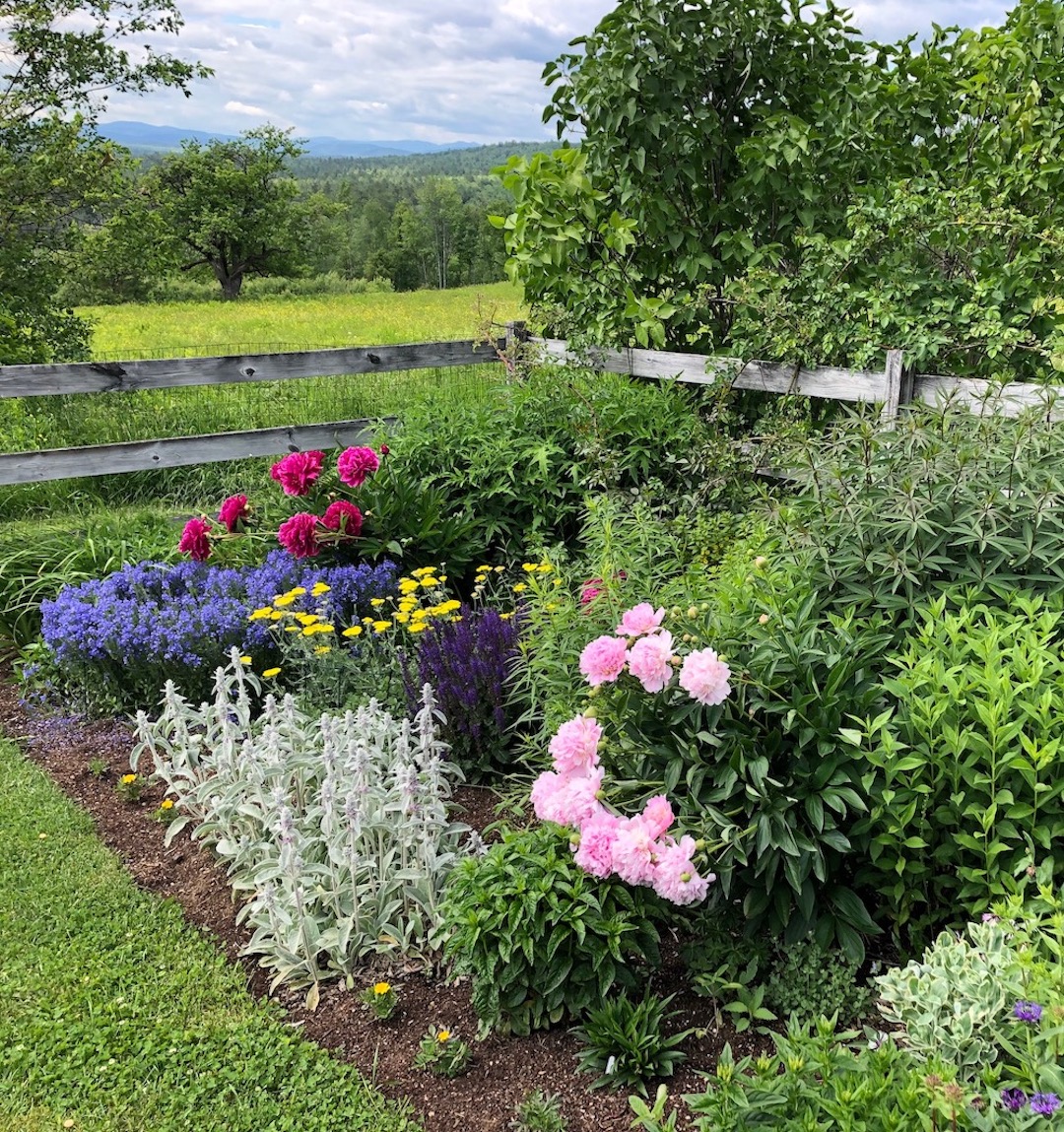
Still the June peak bloom, looking in close at the bottom corner. Here a blue veronica (Veronica sp.and cvs. Zones 4–8)contrasts with peony ‘Mighty Mo’ (Paeonia ‘Mighty Mo’, Zones 3 – 8). Yellow yarrow ‘Moonshine’ contrasts with purple Salvia ‘May Night’ (Zones 4 – 9). I do not know the name of the light pink peony.

In late June or early July the rose blooms on the fence. I think it is American Pilar rose; it was given to me as a layering with the name ‘pilar rose’. The purple clump is Campanula glomerata (Zone 3 – 8). It is gorgeous but I had to reduce it drastically since this photo was taken because it wants to take over the whole garden. It is a challenge when it spreads into other perennials. On the right near the fence is Siberian catmint (Nepeta sibirica, Zone 3 – 8).
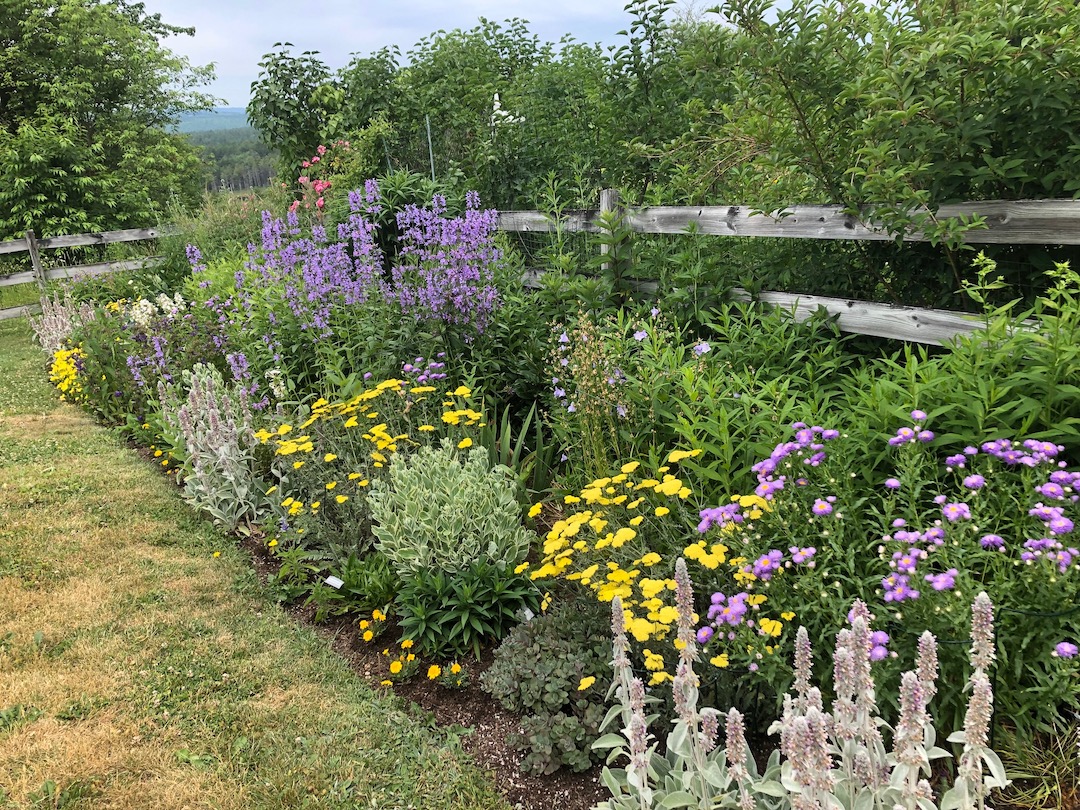
From another angle (and another year) this early July scene shows Nepata sibirica (Siberian catmint) on the left, Achillea ‘Moonshine’ (yellow yarrow) on either side of Hylotelephium ‘Frosty Morn’ (Zones 3 – 9, formerly called sedum), and an unknown Erigeron to the right. The catmint will bloom through most if not all of July and August. Later in July this border makes less of a statement while the nearby pool garden bursts with color.
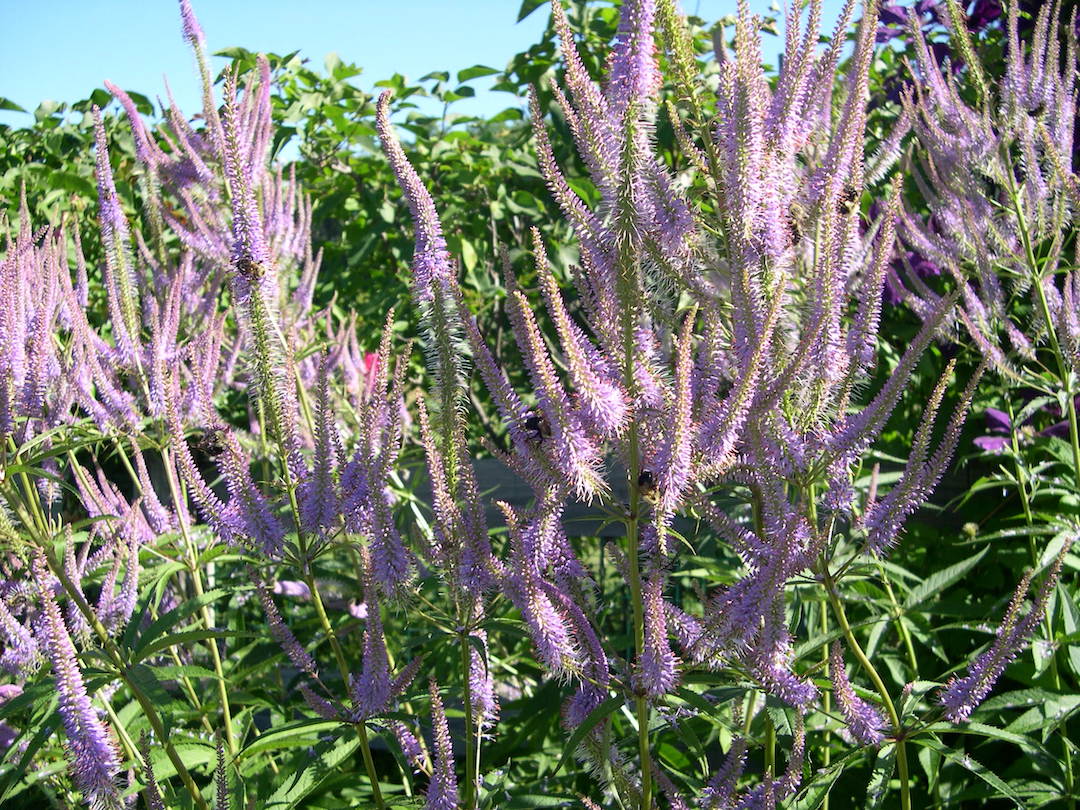
The most interesting plant in the fence garden in mid July is Veronicastrum virginicum ‘Fascination’ (Culver’s root, Zone 3 – 8). It is a pollinator magnet as is the globe thistle nearby in the garden’s bottom corner (not in picture).
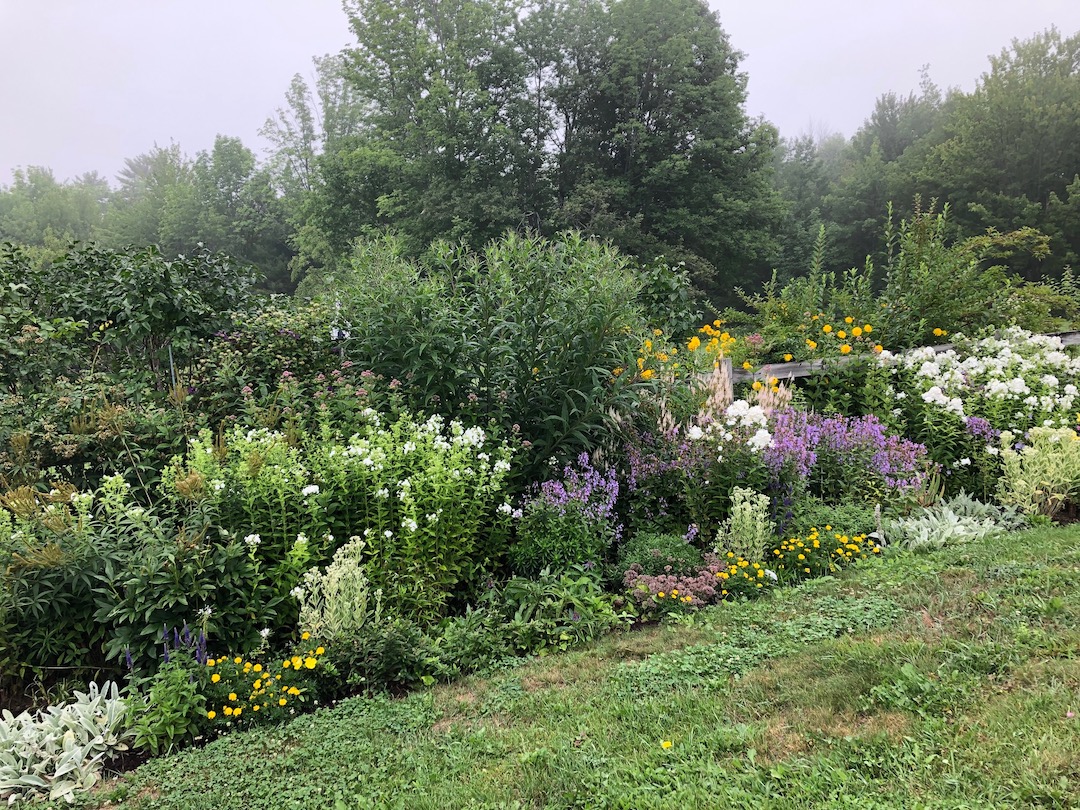
In the middle of August other native plants begin their run including Joe Pye weed (Eupatorium dubium ‘Little Joe’, Zones 3 – 9), the pinkish flower behind the white phlox (Phlox paniculata, Zone 5 – 9) to the right of the photo. Above the Joe Pye weed the dark purple Clematis ‘Jackmanii’ (Zone 4 – 8) is finishing its season of flowers. To the far right the structure of the ‘Fascination’ flowers remains as it goes to seed. The straight species of culver’s root is white, blooms a little later than the cultivar, and is visible in front of the tall yellow flower behind the fence, an old fashioned flower called Golden Glow (Rudbeckia lanciniata ‘Golden Glow’, Zone 3 – 9). Besides the clumps of phlox, some ‘David’ and some ‘Fuji’, Siberian catmint and ‘Frosty Morn’ continue to make their presence known. The small annual marigolds are growing in the front while Sedum ‘Ruby Glow’ is the low plant in the front center.
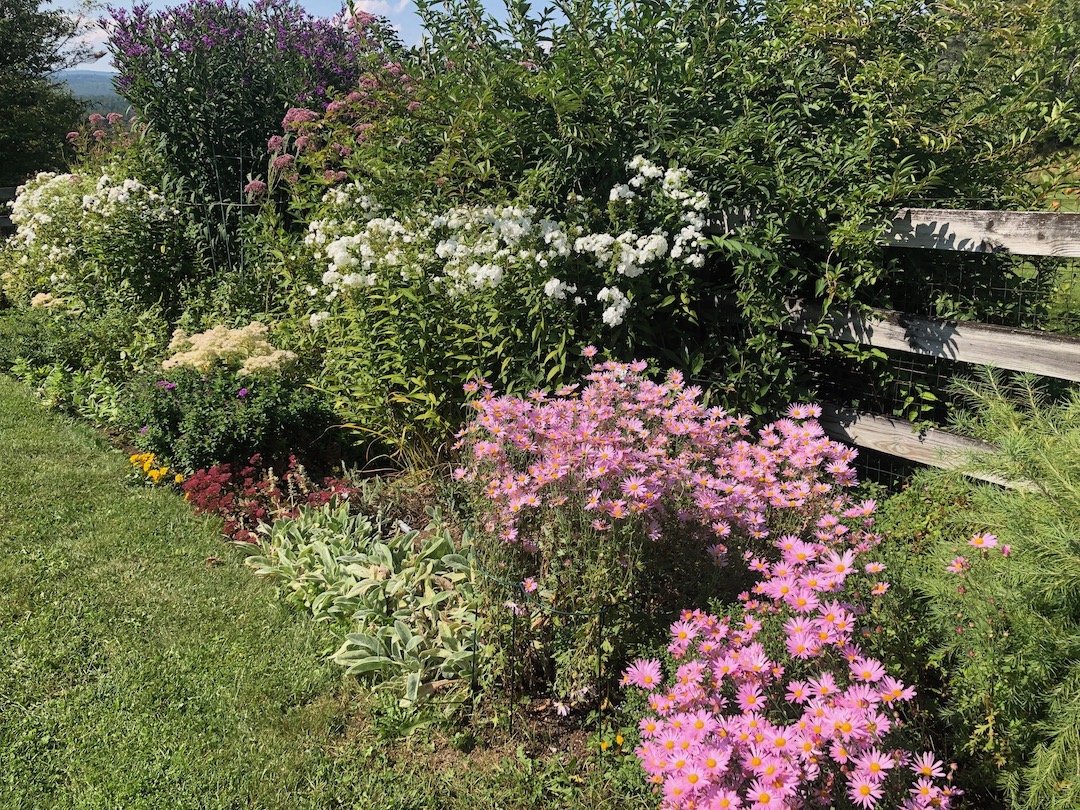
In early September the garden peaks again. The tall purple flower is Vernonia noveboracensis (ironweed, Zone 5 – 9) flanked by Joe Pye weed. To the right is a pink hardy chrysanthemum, likely Chrysanthemum ‘Clara Curtis’ (Zone 5 – 7).
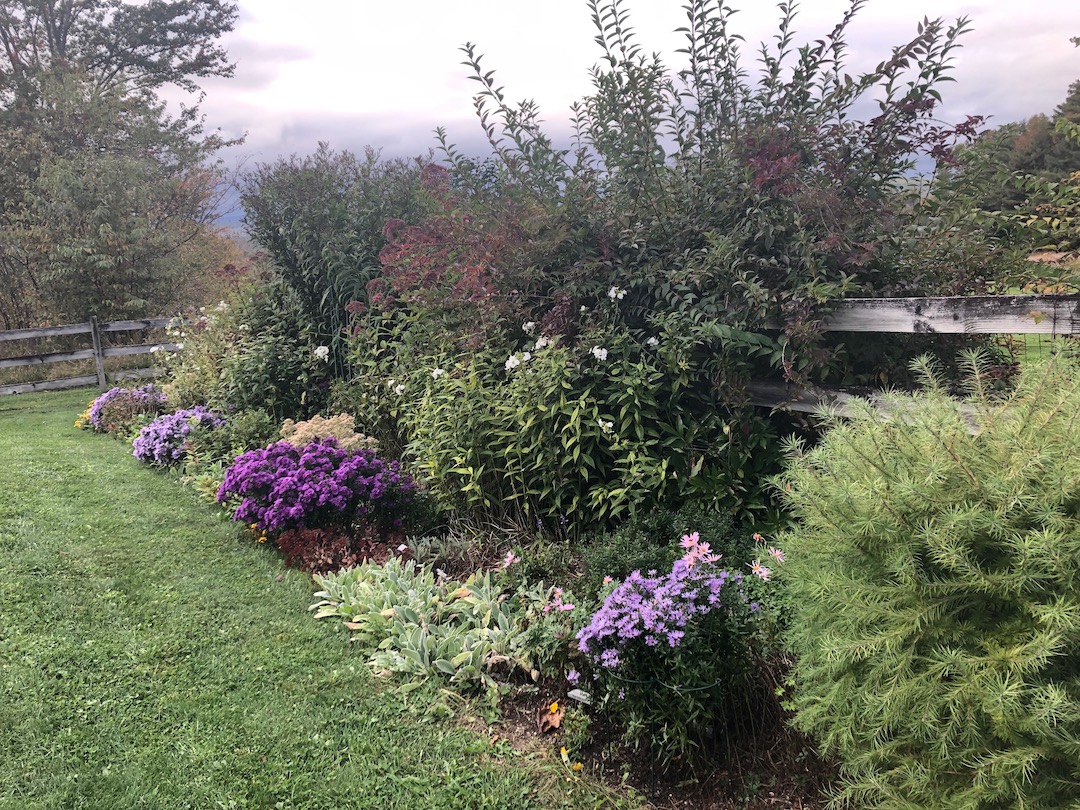
October is aster month. New England aster ‘Purple Dome’ (Symphytotrichum novae–angliae, Zone 4 – 8) was just starting in the previous picture and is now in full bloom. Three clumps of ‘Wood’s Blue’ aster provide rhythm. Joe Pye weed has turned maroon as it goes to seed. The last of the white phlox shed their petals. The lamb’s ears have been deadheaded. The pollinators they supported are now enjoying the asters.
Have a garden you’d like to share?
Have photos to share? We’d love to see your garden, a particular collection of plants you love, or a wonderful garden you had the chance to visit!
To submit, send 5-10 photos to [email protected] along with some information about the plants in the pictures and where you took the photos. We’d love to hear where you are located, how long you’ve been gardening, successes you are proud of, failures you learned from, hopes for the future, favorite plants, or funny stories from your garden.
Have a mobile phone? Tag your photos on Facebook, Instagram or Twitter with #FineGardening!
Do you receive the GPOD by email yet? Sign up here.
